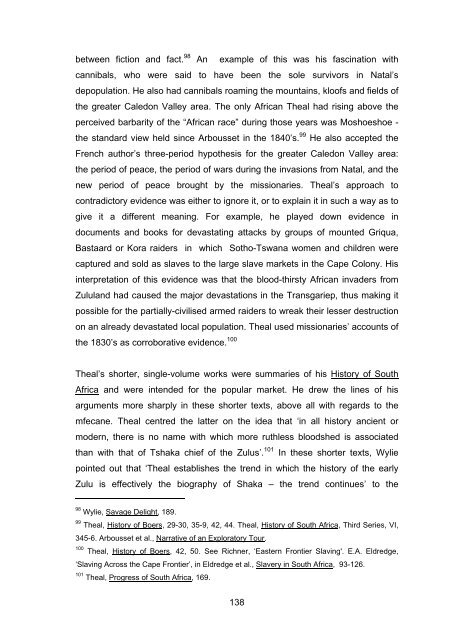The Historiographical Development of the Concept “mfecane” and ...
The Historiographical Development of the Concept “mfecane” and ...
The Historiographical Development of the Concept “mfecane” and ...
Create successful ePaper yourself
Turn your PDF publications into a flip-book with our unique Google optimized e-Paper software.
etween fiction <strong>and</strong> fact. 98 An example <strong>of</strong> this was his fascination with<br />
cannibals, who were said to have been <strong>the</strong> sole survivors in Natal’s<br />
depopulation. He also had cannibals roaming <strong>the</strong> mountains, klo<strong>of</strong>s <strong>and</strong> fields <strong>of</strong><br />
<strong>the</strong> greater Caledon Valley area. <strong>The</strong> only African <strong>The</strong>al had rising above <strong>the</strong><br />
perceived barbarity <strong>of</strong> <strong>the</strong> “African race” during those years was Moshoeshoe -<br />
<strong>the</strong> st<strong>and</strong>ard view held since Arbousset in <strong>the</strong> 1840’s. 99 He also accepted <strong>the</strong><br />
French author’s three-period hypo<strong>the</strong>sis for <strong>the</strong> greater Caledon Valley area:<br />
<strong>the</strong> period <strong>of</strong> peace, <strong>the</strong> period <strong>of</strong> wars during <strong>the</strong> invasions from Natal, <strong>and</strong> <strong>the</strong><br />
new period <strong>of</strong> peace brought by <strong>the</strong> missionaries. <strong>The</strong>al’s approach to<br />
contradictory evidence was ei<strong>the</strong>r to ignore it, or to explain it in such a way as to<br />
give it a different meaning. For example, he played down evidence in<br />
documents <strong>and</strong> books for devastating attacks by groups <strong>of</strong> mounted Griqua,<br />
Bastaard or Kora raiders in which Sotho-Tswana women <strong>and</strong> children were<br />
captured <strong>and</strong> sold as slaves to <strong>the</strong> large slave markets in <strong>the</strong> Cape Colony. His<br />
interpretation <strong>of</strong> this evidence was that <strong>the</strong> blood-thirsty African invaders from<br />
Zulul<strong>and</strong> had caused <strong>the</strong> major devastations in <strong>the</strong> Transgariep, thus making it<br />
possible for <strong>the</strong> partially-civilised armed raiders to wreak <strong>the</strong>ir lesser destruction<br />
on an already devastated local population. <strong>The</strong>al used missionaries’ accounts <strong>of</strong><br />
<strong>the</strong> 1830’s as corroborative evidence. 100<br />
<strong>The</strong>al’s shorter, single-volume works were summaries <strong>of</strong> his History <strong>of</strong> South<br />
Africa <strong>and</strong> were intended for <strong>the</strong> popular market. He drew <strong>the</strong> lines <strong>of</strong> his<br />
arguments more sharply in <strong>the</strong>se shorter texts, above all with regards to <strong>the</strong><br />
mfecane. <strong>The</strong>al centred <strong>the</strong> latter on <strong>the</strong> idea that ‘in all history ancient or<br />
modern, <strong>the</strong>re is no name with which more ruthless bloodshed is associated<br />
than with that <strong>of</strong> Tshaka chief <strong>of</strong> <strong>the</strong> Zulus’. 101 In <strong>the</strong>se shorter texts, Wylie<br />
pointed out that ‘<strong>The</strong>al establishes <strong>the</strong> trend in which <strong>the</strong> history <strong>of</strong> <strong>the</strong> early<br />
Zulu is effectively <strong>the</strong> biography <strong>of</strong> Shaka – <strong>the</strong> trend continues’ to <strong>the</strong><br />
98 Wylie, Savage Delight, 189.<br />
99 <strong>The</strong>al, History <strong>of</strong> Boers, 29-30, 35-9, 42, 44. <strong>The</strong>al, History <strong>of</strong> South Africa, Third Series, VI,<br />
345-6. Arbousset et al., Narrative <strong>of</strong> an Exploratory Tour.<br />
100 <strong>The</strong>al, History <strong>of</strong> Boers, 42, 50. See Richner, ‘Eastern Frontier Slaving'. E.A. Eldredge,<br />
‘Slaving Across <strong>the</strong> Cape Frontier’, in Eldredge et al., Slavery in South Africa, 93-126.<br />
101 <strong>The</strong>al, Progress <strong>of</strong> South Africa, 169.<br />
138

















